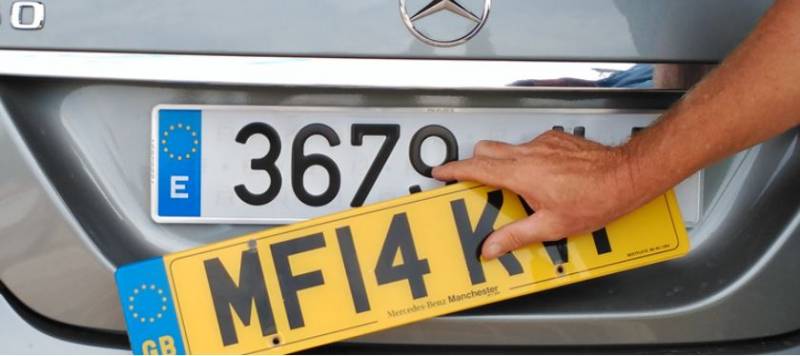Common Challenges Encountered Throughout Foreign Car Registrations and How to Overcome Them
Navigating the complexities of international automobile registrations can be a complicated task, filled with difficulties that vary significantly throughout jurisdictions. Issues such as decoding neighborhood policies, overcoming language barriers in essential documents, and fixing up discrepancies in lorry specs often emerge.

Comprehending Regional Laws
Navigating the intricacies of international car registration starts with a complete understanding of regional regulations. Each nation has its certain laws and needs regulating the registration of cars, which can vary significantly from one jurisdiction to an additional (Register a foreign Vehicle in Spain). It is vital for foreign vehicle proprietors to familiarize themselves with these laws to make sure compliance and avoid prospective fines or legal complications

Additionally, some jurisdictions mandate car inspections to identify compliance with neighborhood security and exhausts requirements. This might require modifications to the automobile before it can be lawfully registered. Involving with local authorities or seeking advice from legal specialists can supply clarity on these guidelines.
Language Obstacles in Paperwork
Language obstacles position substantial challenges when it pertains to the documents required for international vehicle registration. Many individuals run into difficulties in comprehending the specific demands detailed in local policies, as these papers are often published in the main language of the host nation. Misinterpretations can result in the entry of incorrect or incomplete documents, causing hold-ups or denial of registration.
Additionally, crucial documents, such as title deeds, proof of ownership, and insurance plan, may not have easily offered translations - Register a foreign Vehicle in Spain. This can develop complication for international vehicle owners who are unknown with the regional terminology and lawful lingo. Because of this, navigating the registration process ends up being difficult, frequently requiring extra time and effort to make sure conformity
To minimize these concerns, it is suggested for international automobile owners to seek specialist translation solutions or consult local experts that can aid in recognizing the requisite documents. In addition, federal government companies may supply multilingual sources or guidelines to help with the registration procedure. Proactively resolving language obstacles can enhance the registration experience, guaranteeing that all required records are properly prepared and submitted based on local regulations.
Lorry Requirements Inconsistencies

Experiencing lorry spec disparities can produce substantial hurdles for get more international vehicle owners during the enrollment process. These inconsistencies often develop from distinctions in manufacturing criteria, dimension units, and regulative needs between the automobile's nation of origin and the host nation. A vehicle that satisfies security and exhausts criteria in one country may not align with the specs needed for enrollment in an additional, leading to delays or straight-out rejections.
To conquer these difficulties, it is critical for international vehicle owners to conduct extensive research study before starting the enrollment procedure. This consists of recognizing the particular needs established by the local authorities, such as safety standards, emissions levels, and any necessary modifications. Engaging with a specialist solution concentrating on international lorry enrollment can also give useful understandings and aid in browsing these inconsistencies.
Paperwork plays an essential function, so guaranteeing that all technical specifications and alterations are precisely shown in the paperwork can mitigate concerns. In addition, preserving open communication with neighborhood enrollment authorities can provide quality on any kind of prospective discrepancies, permitting for prompt resolution and effective registration of the vehicle.
Browsing Tax Requirements
Recognizing the tax requirements connected with foreign vehicle enrollment is vital for owners aiming to follow local laws. Each territory has certain tax commitments that need to be fulfilled prior to a vehicle can be legitimately registered. These might include import obligations, value-added taxes (BARREL), and annual vehicle tax obligations, which can vary substantially depending on the automobile's origin, value, and requirements.
To navigate these tax obligation requirements successfully, vehicle owners need to start by researching the certain tax obligations appropriate in their location. Consulting with local tax authorities or a tax obligation professional with experience in foreign automobile registrations can offer quality on the procedure and potential obligations.
In addition, it is crucial to preserve detailed documentation of the car's acquisition and any kind of payments made, as this will be needed for tax obligation calculations and potential audits. Owners must additionally know any deadlines connected with tax obligation settlements to stay clear of penalties or delays in registration.
Evaluation and Compliance Issues
Regularly dealing with evaluation and compliance problems is crucial for proprietors of international lorries looking for to register them in a brand-new territory. Each area has distinctive laws pertaining to lorry safety and security, exhausts, and alterations, which can posture substantial obstacles for proprietors not familiar with regional criteria. Therefore, understanding these needs is crucial to stay clear of hold-ups and extra expenses.
One usual concern emerges when international automobiles do not meet the host jurisdiction's safety and security and discharges requirements. Owners need to proactively confirm that their cars adhere to neighborhood policies, which may entail adjustments or obtaining required documentation from suppliers. Furthermore, many territories need a comprehensive examination by a licensed center, which can result in further issues read this article if the car falls short to satisfy specific standards.
To browse these obstacles, proprietors can seek advice from regional lorry registration authorities or look for support from specialists aware of the enrollment process. Preparing all necessary paperwork beforehand, consisting of previous inspection reports and evidence of conformity, can improve the enrollment process. Inevitably, extensive prep work and awareness of assessment requirements can dramatically enhance the probability of an effective foreign car enrollment.
Conclusion
In summary, the process of international lorry registration involves different obstacles, including comprehension of neighborhood regulations, language barriers in paperwork, disparities in vehicle specifications, navigation of tax demands, and examination and conformity issues. Dealing with these difficulties requires thorough study, use of expert translation solutions, and appointment with local authorities. Engaging specialized services can ensure adherence to safety and my link emissions standards, ultimately helping with a smoother registration process and compliance with all relevant obligations.